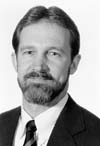 Frances
Lee
Frances
LeeFirst round of ITI grant funds
awarded
Four faculty members have been awarded grants
to enhance their use of educational technology for teaching-learning. Funds
were awarded through the university‚s new Information Technology Innovative
(ITI) Grants program.
Those who received awards during this first cycle include: Frances Lee, associate professor of health administration and policy in the College of Health Professions, Dr. Elizabeth Pilcher, assistant professor of prosthodontics in the College of Dental Medicine, Dr. David Richardson, associate professor of prosthodontics in the College of Dental Medicine, and Dr. Steven Rozenzweig, associate professor of cell and molecular pharmacology in the College of Medicine.
 Frances
Lee
Frances
Lee
Lee received $2,250 to attend a professional development conference, Syllabus 97. This workshop is designed specifically to provide faculty with hands-on experience in developing on-line courses using the Internet. She will attend the conference this fall, and expects to apply what she learns to develop a new on-line course, „Health Information Systems for the Health Professions,š in collaboration with her departmental colleagues, Karen Wager and Andrea White. Lee will also deliver a presentation in the coming year (date, time, place to be announced) to the university faculty to share what she learns as result of participating in the Syllabus 97 faculty development workshop.
 Dr.
Elizabeth Pilcher
Dr.
Elizabeth Pilcher
Pilcher was awarded $13,800 to develop two dental medicine courses in an on-line format for distance learning. One course is an undergraduate course, Fixed Prosthodontics I, that is currently offered to first year dental medicine students. It will be formatted for offering through MUSC‚s Intranet. The other is a continuing education course that will be made available to practicing dentists via the Internet, providing them an opportunity to earn CE credits in a convenient, affordable format. Selected chapters of the Fixed Prosthodontics I course will be offered in digital form in the spring semester 1998, with the complete course offered via the Intranet spring 1999. The CE course will be available for delivery beginning late spring 1998.
 Dr.
David Richardson
Dr.
David Richardson
Richardson received $13,925 for his proposal, „Three-Dimensional Object Digitizing, Modeling, and Rendering for Teaching Three-Dimensional Spacial Concepts in Dentistry.š His project will fabricate life-like computer images of dental casts and denture components to make dental images come alive on screen. Richardson noted in his proposal, „The outcome of applying this revolutionary teaching tool will be the ability to show three-dimensional images during lectures and laboratories, rotating images during real time, thus increasing...understanding by students of diverse conceptual/ spatial ability.š
The digital modeling images will also be used for continuing education of dental medicine alumni and other dentists in South Carolina. Richardson will offer a demonstration of this new technology for MUSC faculty in the coming year (date, time, place to be announced).
 Dr.
Steven Rozenzweig
Dr.
Steven Rozenzweig
Rozenzweig‚s proposal to develop central electronic syllabi was funded in the amount of $6,725. He and his departmental colleagues will initially convert the syllabus for Pharmacology 601 to an electronic format as a model that subsequently can be used to develop electronic syllabi in other courses. Each chapter in the syllabus will be available electronically as a stand-alone file with text, graphics, and other pictorial devices, enabling students and faculty to have continual on-line access to course materials. Once developed, annual updates to the syllabus can be done via the departmental intranet. By generating original graphics, the department will be able to copyright its syllabus, with potential for future publication as a medical pharmacology textbook.
The proposals were evaluated using the following criteria:
The primary purpose of the Information Technology Innovation (ITI) internal grants program is to develop and strengthen the faculty‚s use of educational technologies for teaching and learning. The program is administered through the provost‚s office. The University Educational Technology Articulation Committee, which includes representatives from each college, various academic support services units, and the Student Government Association (see box), serves as the review committee for the awards.
The deadline for the next review cycle is Oct. 1. A copy of the complete guidelines and format for applying for a ITI grant may be obtained from Marcia Higaki, Office of the Associate Provost for Education, room 200G, Administration Building, 792-1928. Questions may be directed to Professor Nancy McKeehan, interim chair of the committee, 792-7672.
Educational Technology Articulation Committee
Janis P. Bellack, Ph.D., R.N., Provost‚s Office-Chair; Nancy McKeehan, MSLS, Library & Learning Resourcesų Interim Chair (9/97-3/98); Gail Barbosa, ScD, RN, College of Nursing Thomas; G. Basler, Ph.D, Library and Learning Resources; Richard Gadsden, Jr, CCIT; Robert Gellin, DMD, College of Dental Medicine; Richard Hernandez, MPH, College of Health Professions; Kristi Lenz, PharmD, College of Pharmacy; Jerry Mallard, TV Services; Mary Mauldin, Med, Educational Technology Lab; Lisa Minnick, MBA, Distance Education; Ronald Nickel, Ph.D., Continuing Education; Michael Schmidt, Ph.D., College of Medicine; John Sutusky, Ph.D., Facilities Planning; Donald Tyner, MBA, SC AHEC; Eberhard Voit, Ph.D., Biometry and Epidemiology; Gretchen Wriston, SGA